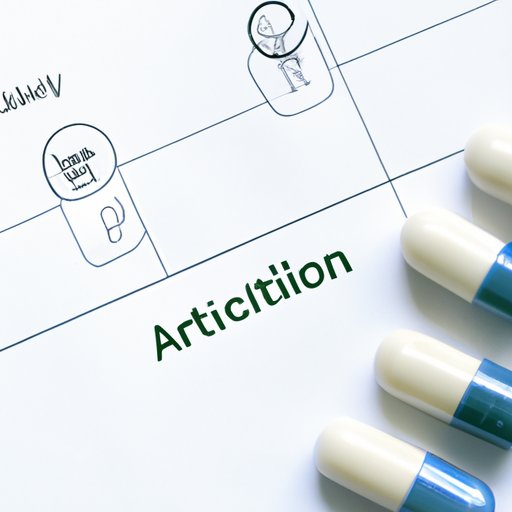
Introduction
If you have ever been prescribed antibiotics, you may have experienced the relief of symptoms that often comes with their use. However, what happens if you stop taking antibiotics then start again? It’s important to know the potential consequences of interrupting antibiotic treatment because it can lead to negative health outcomes and even drug resistance. In this article, we’ll discuss what happens to your body when you stop and restart antibiotics and provide tips to ensure you safely follow your medication schedule.
The Potential Consequences of Stopping and Starting Antibiotics: What You Need to Know
When you stop taking antibiotics and then start again, your body can react in several ways. One potential consequence is that the bacteria being treated may develop resistance to the medication, making it less effective. Additionally, if you have stopped taking antibiotics and then restart, you may experience a recurrence of the infection, which can lead to a longer recovery period.
It’s important to follow your medication schedule to avoid disrupting the treatment process and increasing the risk of antibiotic resistance. If you are experiencing any side effects or negative reactions from the antibiotics, it’s important to speak to your healthcare provider before stopping.
Why Taking Antibiotics as Prescribed is Important: Effects of Discontinuing Treatment
Antibiotics are designed to fight bacterial infections, and it’s important to take them as prescribed to ensure successful treatment. If you stop taking antibiotics before the full course is completed, the bacteria may not be fully eradicated. This can lead to recurring infections, and potentially stronger strains of bacteria that become drug resistant. Some conditions can worsen when you disrupt antibiotic treatment, such as urinary tract infections, skin infections, and pneumonia.
Trouble Restarting Antibiotics? How Stopping Your Treatment Can Affect Your Health
Stopping antibiotic treatment can affect your health in a variety of ways, including the risk of developing antibiotic resistance. Antibiotic resistance occurs when bacteria become resistant to the effects of antibiotics, which can make it difficult to treat future infections. Additionally, restarting antibiotics can be difficult because the bacteria may have developed resistance to the medication since you last took it.
To safely restart antibiotics, speak to your healthcare provider about the appropriate course of action. It’s important to take the medication as instructed, even if you feel better before the course is complete. This can help to ensure the bacteria is fully eradicated, and decrease the risk of developing antibiotic resistance.
The Dangers of Interrupting Antibiotics: What Happens When You Stop and Restart
Interrupting antibiotic treatment can be dangerous and increase the risk of spreading infection, as well as developing secondary infections. Stopping antibiotics can allow bacteria to multiply, potentially leading to further infections. Additionally, when you restart antibiotics, the bacteria may have developed resistance to the medication, making it less effective.
In some cases, stopping and restarting antibiotics can lead to serious infections, such as meningitis or sepsis. These infections can be life-threatening and require immediate medical attention. To avoid these risks, it’s important to take antibiotics as prescribed and not interrupt the treatment process.
Restarting Antibiotics: The Risks Involved When You Don’t Stick to Your Medication Schedule
If you don’t stick to your medication schedule when restarting antibiotics, you increase the risk of developing antibiotic resistance and potentially developing a bacterial infection that is difficult to treat. Some tips for minimizing the risks of interrupting antibiotic treatment include:
- Set reminders to take your medication on-time
- Keep track of when you took your last dose
- Speak to your healthcare provider about any side effects or concerns you have
- Don’t share antibiotics or take someone else’s medication
Conclusion
In conclusion, stopping and starting antibiotics can have negative health consequences, including the potential development of antibiotic resistance. It’s important to take antibiotics as prescribed and not interrupt the treatment process to ensure successful treatment and prevent the spreading of infections. Speak to your healthcare provider if you have any concerns about your medication, and follow the tips provided to minimize the risks of disrupting antibiotic treatment.




